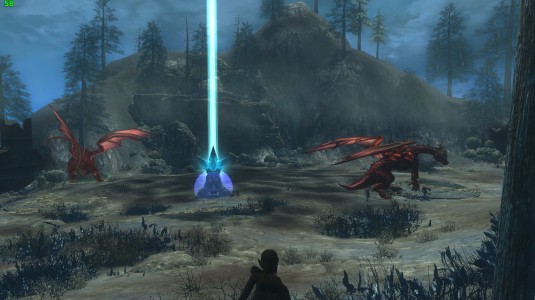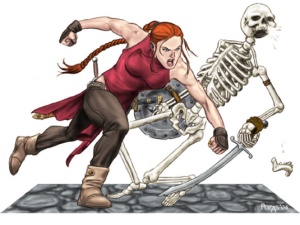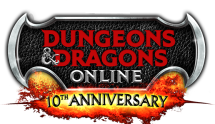
What’s inside Dungeons & Dragons Online?
Only that which you take with you, I believe.
“DDO is dying!” some forum member may exclaim in a poorly written thread that clearly shows that the forum has rolled a 1 in mastering their own mother tongue.
“DDO is alive!” retorts another forum member in reply.
“DoOOOOOoooom!” says another.
We’ve all seen these threads. The phrase has almost become a meme.
Some have tried to document the volume of players per server to prove their point, often pleading the devs to merge servers. This post isn’t going there. I’m going to talk more about the behavior of players, no matter how few or how many, on any server. Nor am I dealing with sexism in gaming that could foster such issues. I’ve written poorly enough on that before.
Too often, a look at the Group LFMs show “BYOH”, short for “bring your own healing”–that is, be self-sufficient in case you’re damaged. That’s different from “bring your own healer” as many PuGs don’t want a hireling to take up a player slot nor cause them to have to expend resources on keeping it alive, much less waiting for a player to keep up while tending to the hireling’s errant behavior.
And once invited into said group, most players just do what they want. A scant few might go off on their own. Many may surge ahead–even if you’re not actually in the quest yet.
I feel this behaviors reflect my hypothesis that most players do not play DDO with a D&D game style. Either they aren’t aware of the game’s synergistic use of classes and have never played that tabletop or similar games before. Perhaps they also don’t care to know. Or, they’ve come from another game that fosters parties for convenience only, and less by tradition or necessity.
There’s also a psychological factor with the nature of the modern gamer.
There are occasional LFMs with “All optionals” in the comments. It may also still say, “BYOH.” That party leader is going to see everything in the quest. They still might not wait for you to see or read what they saw.
I’m not omniscient and cannot prove much of what I cite here, but only note what I’ve read and seen as anecdotal evidence. You can fill in your own to draw a conclusion.
I don’t see the game itself as the problem, but the manner in which many players tackle it. I break down the issue in two ways. These might seem familiar.
Too Many “Heroes”
D&D offers you to create a character, give it a class, and then have it join in with other characters on adventurers. If you win, great. You (and perhaps your party) are hero for the day. Tomorrow may be different.
But a live combat MMO such as DDO tries to combine this party role gaming system with the nature of modern MMO gaming, which allows and even encourages character builds that are more self-sufficient and more solitary. You can play most of DDO as if the world’s fate literally revolves around you, never grouping with anyone. As GamerGeoff opined earlier today, the fact that your sole character can face down a dragon–nay, dragons—leaving mounds of dead wyrms behind you, is a bit anticlimactic.
This isn’t necessarily the fault of the game itself. DDO offers raids and other adventures with mechanics or objectives that absolutely require a party, which infers a certain level of cooperation within it for the team to complete their goal.
However, the mindset of many typical gamers today seems to contradict a cooperative nature. In fact, it seems that many powerful players gravitate towards being the most heavily geared, the most lives lived, or the most powerful. Such achievements do not necessarily require a party. And if they do, it’s less a matter of having friends than of using your friends wisely. In short, players are less communal but still less akin to mercenaries, even if affiliated with a guild.
The tabletop camaraderie isn’t an etched-in-stone requirement. Such player characters might not want to be permanently affiliated with a party as part of their role-play shtick. Emphasis on the tactical use of the word “role” here, not the fantasy behavior.
So what happens when many, many players are “lone wolves?”
Too Little Role Play
As I said, I see most players in DDO have a very low RPG background. This may be by choice in that they may have played some tabletop games before but are here to slay, slay, slay. It may also be that they know nothing of D&D cooperative gaming but to kill for fortune and glory.
Some of DDO’s versions of the D&D character classes are better at going at things alone than not. All have a specific synchronicity for many quest types. None of them were meant to work completely alone. Why is this?
The answer is simple. D&D melds you (as your character) into a story, along with other players. You’re not only a character in a game, you’re a character in a story.
Be it a mystery or other quest, your personal interactions with the world–and even each other as player characters–are both non-combat and combat. DDO mimics a bit of the conversational. “A Study in Sable” comes close to this mechanic, where a bit of exploration yields a hidden secret that will prove helpful at the quest’s end. The start of “The Crucible” requires strong non-combat skills to make your combat (and XP) more rewarding.
So does it make sense that only you become the sole protagonist in a large story? No more so that seeing a movie where Luke Skywalker or Riddick or Indiana Jones are simply interacting with objects. A story is about people, not a person. D&D doesn’t try to portray adventurers as superheroes, but heroes. Heroes do the job despite limits. Their true power is bravery, not gear or brawn.
MMO gaming allows a solo player to emulate a party in some ways for convenience, of course. We can’t all find someone living to group up with at certain times. In DDO, hirelings can fill this out, but they are generally automated combat drones. They cannot interact with other NPCs and the dialogues they show the player character.
So, what’s up with the player psyche nowadays? Why is there a perception or reality that no one wants to group with others anymore? Are the quests a “one-and-done” thing where, once played, the story doesn’t matter to some? Does the story even matter to the modern online player? Does the fate and loot of other players matter to today’s typical player?
There’s some fact to my personal observations–and perhaps your own. Let’s give props to an early gamer that begin to study gamers before gaming was less cool than it is now.
The Bartle Test
Back in 1996, Richard Bartle, a scientist and creator of the very first multi-user dungeon, or MUD (the progenitor of today’s massive multiplayer online role-playing games such as DDO) wrote a paper that studied how a player tends to play inside a MUD/MMO.
Two other scientists built an online test based on this paper. The test’s questions were based on Bartle’s work on character theory. In the case of gaming, how does a player tend to play their character? Bartle broke it down into four categories.
- Achievers (preferred to gain “points,” levels, equipment and other concrete measurements of succeeding in a game)
- Explorers (preferred to be discovering areas, creating maps and learning about hidden places)
- Socializers (preferred to be interacting with other players, and on some occasions, computer-controlled characters with personality)
- Killers (preferred to depart from the norm of being “the good guy” who comes to save the day and play on the side of evil or conquest)
Now, while there are only four categories, this is actually a wider dichotomy that’s commonly classified by DDO players as “zergers” and “flower-sniffers.” To me, the Bartle character theory breaks down the gamer psyche to a finer nuance. The theory may still not satisfy for those who believe Bartle’s characterizations are still too narrow (creating a false dichotomy). For purposes of my discussion, however. this test is a good start to study the DDO player today.
What better way to examine the test, still available at GamingDNA, than to try it out?
Thus, I did. For long-time readers, the results shouldn’t surprise you.

I tend to explore while gaming. That’s not to be confused with “flower sniffing” but to learn what in the world offers or opposes me. Since the DDO world is generally out to get you outside of public areas, knowledge is key to completing a quest without trial and error in the brutish “let’s kill stuff to see what happens” way that others do.
One subcategory in the text probably fits me perfectly. I’m the “Explorer Socializer.” It says: “Explorer Socializers are the glue of the online world. Not only do they like to delve in to find all the cool stuff, but they also enjoy sharing that knowledge with others. Explorer socializers power the wikis, maps, forums and theory craft sites of the gamer world.”
(You’re welcome.)
Now, what kind of gamer are you? I wonder if more people play DDO because there are more people who want cooperative play rather than individual play with very limited and self-serving cooperative means (“I’d rather play alone but we need a healer.”) Perhaps there’s also the breadth of versatility in the DDO game mechanics that allow full use of many D&D traits that other games may not offer that make cooperative play more fortuitous than burdensome.
I see nearly 40% of today’s DDO players as Achiever-types. About 35% are Explorer-types. But I feel Achievers as opportunistic. If some new update drops some complex loot, that percentage rises as some players feel more like an Achiever to get that new stuff.
Thankfully, there’s always a few people who enjoy exploring. They don’t say no to loot, either, but completion, even creatively doing so by stealth, unusual combat or other non-combat skills or abilities, is their priority.
I can’t really say if Explorers are necessarily the party-type, either. I know that I don’t tend to find groups willing to get on sneaky runs into the Underdark or the Storm Horns. And perhaps the Achievers are moving too fast and with too strong a drive for some players to follow along.
Makes me wonder how good (or bad) does DDO have it in terms of cooperative play versus other MMOs?
Take the Bartle Test of Gamer Psychology at this link and share your results here or on the Fansite thread for this blog post. If enough people post their results, I’ll compile them for review later. Or, talk about your experiences. Do you notice some guilds favor one of the four Bartle characterizations? (Don’t name names, please). In what way do you foster a particular game style?
Epilogue
I did additional research with one presumption: That players are offered MMO worlds which deliver a poor RPG environment from the outset. How can you learn RPG synergy if the games you play don’t bother to try to illustrate the advantages? If everyone can pick a lock, who needs the Rogue? If everyone can help themselves, why add the Cleric to the party?
The recently released Neverwinter world by Cryptic always smelled funny to me for this reason. My guild has an affiliate presence there and it satisfied the young and curious in the guild with lots of shinies. But now, I hear very little talk about it.
Reviews from reputable gaming websites and magazine slam Neverwinter for a design that concentrates more on player power (often by monetization) and less on the storyline. With just a bare five D&D classes offered, none of them the Monk class, I’ve never bothered to try it.
If games such as these don’t encourage other facets of RPG gaming other than slaying (which is a valid component, but not the only one), how will RPG gaming endure, I wonder? Is the Millennial generation’s isolated individualism being reflected in RPG play? Since human interaction seems to be less direct than indirect (electronically), how can RPG as a whole survive?
Despite the individualistic challenges of society that are becoming more reflected in general gameplay as a more isolated entertainment form, there’s still hope. The nature of the guild forces introverted folks like me to work with others and be sociable. DDO itself, through its D&D roots, provides the framework.
Is DDO alive or dead? Look inside the box. The answer you’ll get depends on what you expect to see there.
As a wise man once said, “When we cease expecting, we receive all things.”







Recent Comments